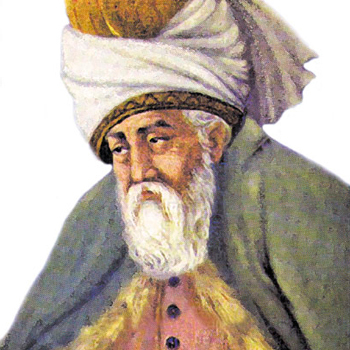The views expressed in our content reflect individual perspectives and do not represent the authoritative views of the Baha'i Faith.
If you’re from the west, you may not know that Islam has a long history of mysticism and spiritual search—unless you’ve read Rumi’s poetry.
Rumi, chief among the great Muslim mystical poets, probably represents the only encounter most Westerners ever have with the many Sufi mystical orders and their remarkable levels of spiritual insight. Known in Turkey as Mevlana, in Iran as Molavi, and in his native Afghanistan as Mawlana, the name Rumi simply means “from Rum,” or Rome, because Rumi and his family moved to the Anatolian, Roman-controlled Byzantine region of Turkey when the Mongols invaded Central Asia early in the 13th Century.
We tend to associate Rumi’s perennially popular poetry, which crosses all borders and cultures, with the subject of romantic love:
Love shunneth this world and that world too
In him are lunacies seventy-and-two
The minstrel of love harpeth this lay
Servitude enslaveth, kingship doth betray. – Rumi, The Masnavi, quoted in Baha’u’llah’s The Four Valleys, p. 54.
But the enduring nature of Rumi’s work for the past thousand years or so may have more to do with his deep understanding of the human soul than it does with romantic love. The founder of the Mevlevi Sufi order, Rumi wrote extensively about romantic love—but he consistently employed it as a metaphor for the higher love of the divine and the beauty of the spiritual path. He focused on tawhid—union with the ultimate Beloved—and made it the overarching theme of his work. When you read his work carefully, you’ll discover that Rumi cared most about spiritual growth:
Little by little, wean yourself. This is the gist of what I have to say. From an embryo, whose nourishment comes in the blood, move to an infant drinking milk, to a child on solid food, to a searcher after wisdom, to a hunter of more invisible game. – Rumi

Rumi
Rumi’s Mevlevi Sufi order still exists today. You might know them from an ecstatic spiritual practice called Sama, where the phrase “whirling dervishes” originates. Mevlevi Sufis perform their dhikr—their remembrance of God—as a spinning, whirling dance called the Sama, which symbolizes the spiritual ascent of the soul through four specific stages of inner growth.
In the Sama, those four stages—a search for the truth; the recognition of the knowledge of God; the ecstasy of love and total surrender; and the arrival at the “Perfect,” or the peace of divine unity—all represent the typical upward movement of the human soul as it progresses toward its ultimate goal, reunion with its Creator.
This ancient tradition of a four-stage path to spiritual growth has instructed and fascinated seekers for many, many centuries, long before and long after Rumi made it better known in the west. Reawakened and reinterpreted by Baha’u’llah in The Four Valleys, which was originally a letter to a Sufi mystic, we now have a modern version of the four-stage path for contemporary seekers.
The Sufi mystic and leader Baha’u’llah addressed, Shaykh Abdu’r-Rahman, led the Qadiriyyih Sufi order in the Kirkuk region during the middle of the 19th Century. He had more than a hundred thousand followers who practiced the Sufi virtues of detachment, meditation and transcendence. The Sufis typically belong to different turuq, or orders, each organized around the teachings of a Sufi master. Like Zen masters, the leaders of various Sufi orders study and contemplate the mystical realities for their entire lives. Shaykh Abdu’r-Rahman’s Qadiriyyih order famously focused on the eternal inner human struggle to transcend the ego.
Baha’u’llah’s epistle to the Shaykh, originally called The Seeker’s Path (Risalih-i-Solouk, in Persian), and now known as The Four Valleys, maps out a path of spiritual maturation, growth and development. At the beginning of his small book—less than 20 pages long—Baha’u’llah employs the classical conventions and the elevated literary style of the culture and the period, with the inclusion of quotations from the Qur’an and from the great Sufi poets like Rumi and Sa’di. In the introduction to The Four Valleys, Baha’u’llah quotes one entrancing couplet from Rumi:
Each moon, O my beloved, for three days I go mad;
Today’s the first of these—‘tis why thou seest me glad. – Rumi, The Fragile Vial.
For the Sufis, the madness that comes with the full moon symbolizes joyful, mystical intoxication with the love of the transcendent and the divine. In The Four Valleys, Baha’u’llah describes the steps we can all take on the ladder of ascent toward that enraptured spiritual plane.
















Comments
Sign in or create an account
Continue with Googleor